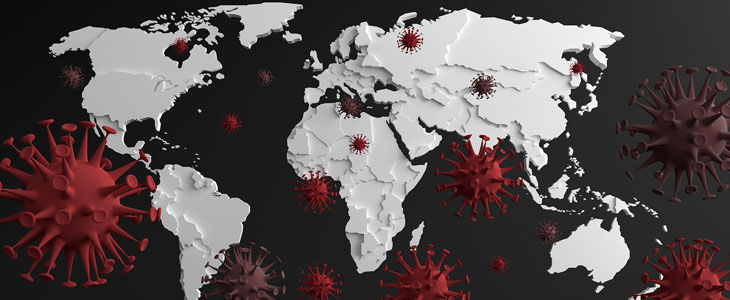
In the past several months, people worldwide have been affected by COVID-19. As people have been dealing with fear of contracting the virus, criminals have been quick to adapt and take advantage of the pandemic to commit financial crimes, such as money laundering. This article highlights the increase of money laundering-related crimes in Europe, China and throughout the world during the pandemic.1
Fake E-commerce Sites
It is well-known that COVID-19 boosted the e-commerce business, with online retailers now receiving regular orders as a result of the lockdown. Thus, criminals have used this to their benefit and have introduced a new type of e-commerce scam: fake shops, websites, social media accounts and email addresses claiming to sell facial masks and medical supplies online. In some of these schemes, victims make online purchases, but instead of receiving their items, their money disappears into the hands of criminals. Then, fraudsters will promptly move the money into bank accounts in foreign jurisdictions, making it harder for local authorities to trace transactions.2
Brushing Scheme in China
Whilst criminals worldwide have been claiming to sell medical supplies, fraudsters in China have been using more sophisticated scams. They ship packages containing ‘lightweight goods of trivial value’, which can then be used to log fake sales and generate fake positive reviews, drawing the attention of customers and boosting sales.3
This tactic is also known as brushing scheme, where a ‘brusher’, the person who provides fake reviews, receives payment from the vendor for the cost of products they will be ordering online. The ‘brusher’ then places online orders for the vendor’s goods. The vendor ships parcels that contain low-value goods. Once the ‘brusher’ receives the goods, they write positive reviews, which in turn boost the vendor’s ranking on a marketplace, leading genuine buyers to believe that the vendor has a good reputation. Over the last several years, many international online marketplaces have enrolled Chinese merchants to sell various products online. Whilst some of them might seem legitimate, it is always useful to make a judgement call by independently verifying the vendor before ordering items from them. Make sure that the vendor has an extensive public profile that is not solely a one-page website, but rather a site that provides a history of the company’s formation and description of the nature of its business.
The Furlough Scheme in the UK
In the UK, a new type of fraud emerged when criminals started using a furlough scheme for criminal purposes. The Coronavirus Job Retention Scheme, commonly known as the furlough scheme, was offered to businesses by the UK government to support their employees by paying them 80% of their salaries during the pandemic. Some small businesses started appointing members of their families as directors of companies to increase the threshold of government support artificially with monthly salaries for shareholders who also act as directors. Whilst the government may not have identified all criminals using the furlough scheme for their opportunistic goals; some individuals have been convicted. For example, a 57-year-old man became the first person in the UK to be arrested in connection to a suspected £495,000 fraud to the government through the furlough scheme.4 Whilst this is only one example, there will likely be more to come.
‘Ndrangheta’s Front Companies in Italy
Although criminals in the UK and other European countries have succeeded in various frauds and scams, Italy’s weak controls and enforcement have compounded the problem. The ‘Ndrangheta is the Italian-based criminal syndicate that originated in Calabria, Italy in the 19th century. The group is known for being the main supplier of drugs to Europe. However, apart from drug trafficking, its revenue also comes from ostensibly legal businesses such as construction, restaurants and supermarkets. The leading families of ‘Ndrangheta have been making vast profits from contracts given to their own front companies through corrupt local officials, as well as by establishing monopolies on services ranging from delivering patients in faulty ambulances, to transporting blood, to providing funeral services. Some doctors in Italy reported that criminal control of hospitals has been so tight, staff at times have had to ‘wait outside a hospital ward for men from the ’Ndrangheta to open the locked door with their keys.’ The money gained via these criminal activities was laundered through financial centres in Milan, London and Luxembourg.5
Conclusion
The aforementioned criminal activities demonstrate how laundered money is frequently connected to fraudulent activities and corruption, both of which are money laundering offences. How can financial crime experts, especially those who work in the financial industry, identify financial crime risks? First and foremost, raise awareness among staff of money laundering risks and how they should be mitigated. Make sure that the source of wealth and the source of funds from the business is well understood and documented.6 Compare the nature of the business (whether it be a new or existing client) with the figures on the company’s balance sheet. The source of wealth and the source of funds should not only be a tick-box exercise.
As a result of increased criminal activity during the pandemic, when clients wish to invest a significant amount of cash, financial institutions (FIs) should not automatically accept the cash and its nature just because it comes from a long-standing customer with a previously established nature of business. Regardless of the length of the relationship with clients, FIs should always ascertain whether the levels and types of clients’ transactions are consistent with the firm’s knowledge of its customers. Minor inconsistencies in figures should be analysed and flagged if there is no logical or practical explanation behind the transactions.
Nadya Lyubavskaya, chief risk officer, TFC Compliance,
nlyubavskaya@tfccompliance.com
- “Statement by the FATF President: COVID-19 and measures to combat illicit financing,” Financial Action Task Force, 1 April 2020, https://www.fatf-gafi.org/publications/fatfgeneral/documents/statement-covid-19.html
- “INTERPOL warns of financial fraud linked to COVID-19,” Interpol, 13 March 2020, https://www.interpol.int/en/News-and-Events/News/2020/INTERPOL-warns-of-financial-fraud-linked-to-COVID-19
- Harriet Alexander, “Mysterious seeds sent from China to thousands of Americans across the US may be part of a giant online reviews scam,” Daily Mail, 29 July 2020, https://www.dailymail.co.uk/news/article-8569561/Mystery-plant-seeds-sent-China-U-S-homes-solved.html
- “First person arrested over alleged fraud of furlough scheme,” The Independent, 9 July 2020, https://www.independent.co.uk/news/uk/crime/furlough-scheme-fraud-arrested-hmrc-west-midlands-a9610111.html
- How the Mafia infiltrated Italy’s hospitals and laundered the profits globally,” Financial Times, 15 July 2020, https://www.ft.com/content/8850581c-176e-4c5c-8b38-debb26b35c14
- “Financial Crime Guide: A firm’s guide to countering financial crime risks (FCG),” Financial Conduct Authority, July 2020, https://www.handbook.fca.org.uk/handbook/FCG.pdf










